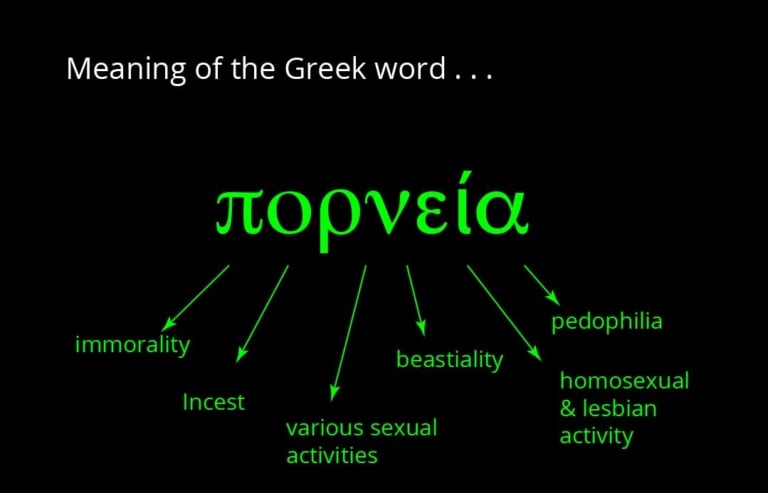What Does Porneia Mean? Unpacking A Key Biblical Term Today
Detail Author:
- Name : Claud Yundt
- Username : dion.brakus
- Email : schroeder.ruby@thiel.biz
- Birthdate : 1989-04-13
- Address : 43345 Aubree Cliff Suite 748 Linwoodport, OR 35225-8390
- Phone : +1 (312) 205-9818
- Company : Bergnaum-Bednar
- Job : Public Relations Specialist
- Bio : Porro voluptates maiores et praesentium odit minus. Et vel voluptas doloribus architecto. Atque accusantium fugit iusto eum.
Socials
linkedin:
- url : https://linkedin.com/in/gilberto9488
- username : gilberto9488
- bio : Repudiandae ea ut sunt.
- followers : 4479
- following : 424
twitter:
- url : https://twitter.com/kihn1977
- username : kihn1977
- bio : Corporis nobis architecto numquam aut ut quia. Est labore consectetur officia alias repellat sit voluptatibus. Ratione reiciendis quia enim explicabo impedit.
- followers : 6455
- following : 1215
Words, you know, they really hold a lot of weight, don't they? Sometimes, a single word can carry so much meaning, yet it might be easily misunderstood or even used in ways that don't quite fit its true sense. Getting to the heart of what a word truly means, that's often where the real understanding begins. It's a bit like how "My text" helps us grasp the difference between "do" and "does," explaining that "Which is the correct form to use depends on the subject of your sentence." That kind of clear definition, you see, is absolutely vital for making sense of things, especially when we're talking about important concepts.
When we look at ancient writings, particularly sacred texts, we often come across terms that seem straightforward at first glance but actually hold layers of meaning. "Porneia" is one such word, a Greek term that appears quite a bit in the New Testament. For many, it might seem simple, yet its full scope is, arguably, much broader than some might initially think. It's a word that has shaped, and continues to shape, discussions about human behavior and moral choices for centuries.
So, what exactly does "porneia" truly mean? And why does its accurate definition matter so much for us, right now, in our modern world? This article is here to take a closer look at this significant term, exploring its origins, its various applications, and why a clear grasp of it can help us better understand some very old, but still very relevant, ideas about life and relationships.
Table of Contents
- Why Understanding Words Truly Matters
- What is Porneia? Getting to the Core Meaning
- Distinguishing Porneia from Similar Terms
- Porneia in Ancient Contexts and Today
- Why This Definition Matters for You
- Common Questions About Porneia
- Looking Ahead: Applying What We've Learned
Why Understanding Words Truly Matters
It's fascinating, isn't it, how words really shape our thoughts and, in a way, our entire view of the world? A slight misunderstanding of a word, just a little twist in its definition, can sometimes lead to quite different ideas or actions. You know, "My text" points out how "do" and "does" are often used interchangeably, but they have different meanings and uses. It really emphasizes how "understanding when to use 'do' and 'does' is key for speaking and writing English correctly." This principle, you see, applies to so many other words, especially those with deep historical or spiritual significance.
Getting the right picture, that's what it's all about. Just as "My text" notes that "to define the word, when you do something, this means you “perform, take part in, or achieve something,”" so too, defining words like 'porneia' helps us grasp what's truly being talked about. Without that clear definition, things can get rather messy, more or less. It's about precision, which is something we often overlook in our fast-paced discussions today. We tend to assume we know what a word means, but sometimes, the actual meaning is, well, a bit more involved.
Consider how often we might use a word loosely, not quite hitting its precise mark. This can lead to all sorts of confusion, particularly when we're trying to interpret something from a different time or culture. So, taking the time to truly explore a word's definition, its roots, and its various applications, it's a very worthwhile effort, actually. It helps us build a stronger foundation for our thoughts and conversations, giving us a clearer path forward, you know?
What is Porneia? Getting to the Core Meaning
Now, let's turn our attention to "porneia." This Greek word, transliterated into English, often gets translated as "fornication" or "sexual immorality." But, to be honest, those English words don't always capture the full breadth of what "porneia" really meant in its original context. It's a bit like trying to perfectly explain a complex concept with just one or two simple words; you tend to lose some of the nuance, you know?
At its very core, "porneia" refers to any kind of unlawful or illicit sexual activity. This is a very broad term, and that's important to keep in mind. It's not limited to just one specific act. Instead, it encompasses a whole range of sexual behaviors that were considered outside the established moral and legal boundaries of the time, especially those set by divine law. It's a word that covers a lot of ground, which is why understanding its full scope is pretty important.
Think of it this way: if a sexual act was not part of a lawfully recognized marriage, or if it violated other specific prohibitions, it could generally fall under the umbrella of "porneia." This broadness is a key characteristic of the term, and it’s something that often gets overlooked in everyday conversation. So, when you see "porneia" in a text, it's usually referring to a widespread category of sexual wrongdoing, rather than just one isolated instance, you see.
Porneia's Scope: More Than Just One Thing
Because "porneia" is such a wide-ranging term, it naturally includes several specific types of sexual misconduct. It's not just about one thing, which is a common misunderstanding. For instance, it typically covers:
- Prostitution: This is, arguably, one of the most direct meanings of "porneia," as the root word "porne" means "prostitute." So, any act related to commercial sex would certainly fall under this.
- Premarital Sex: Sexual relations between unmarried individuals are also generally included. In many ancient societies, and certainly within the biblical framework, sexual activity was meant to be exclusive to marriage.
- Adultery: While there's a more specific Greek word for adultery ("moicheia"), "porneia" can sometimes act as a broader category that includes adultery, especially when emphasizing the illicit nature of the act.
- Incest: Sexual relations between close relatives, which were strictly forbidden, are also a form of "porneia."
- Homosexual Acts: These, too, were often considered forms of "porneia" in the ancient world, particularly in the context of the cultural and religious norms of the time.
- Bestiality: Sexual acts with animals, another strictly forbidden practice, would also be covered by this broad term.
This comprehensive nature of "porneia" means that when you encounter it, you're looking at a concept that covers, more or less, all sexual activity outside of what was considered a proper, lawful, and divinely sanctioned union. It's a pretty inclusive term, you know, for anything that goes against the established order of sexual relations. So, it's not just about what one "does," but rather the nature of the act itself, in a way.
Distinguishing Porneia from Similar Terms
It's very common to see "porneia" alongside other words that also describe sexual wrongdoing, and sometimes, the distinctions can feel a bit blurry. However, recognizing these differences is pretty important for a deeper understanding. It's a bit like how "My text" describes the distinction between "do" and "does," noting "Do and does are two words that are often used interchangeably, but they have different meanings and uses." Just as understanding that difference is "key for speaking and writing English correctly," grasping the full scope of "porneia" and its relatives is vital for understanding ancient texts.
The most frequent comparison is often made with "moicheia," which specifically means "adultery." While "porneia" is the broad term for any illicit sexual activity, "moicheia" is much more specific: it refers to sexual relations where at least one of the parties is married to someone else. So, while adultery is certainly a form of "porneia," "porneia" is not always adultery. This distinction is, arguably, a pretty significant one.
For example, premarital sex would be "porneia" but not "moicheia" because neither party is married. However, an affair between two married people would be both "porneia" (illicit sexual activity) and "moicheia" (adultery). This kind of nuance, you see, is what helps us get a clearer picture of what's being communicated. It's about understanding the specific type of wrongdoing being highlighted, which really matters for interpreting the message correctly. So, while they are related, they are not quite the same, just like "do" and "does" serve different roles in a sentence, as "My text" explains, "See examples of does used in a sentence."
Porneia in Ancient Contexts and Today
To truly grasp "porneia," it helps to think about the world where this word was commonly used. In Greco-Roman society, and particularly within the Jewish and early Christian communities, there were very specific views on sexual conduct. Sexual morality was often tied to religious purity, social order, and the sanctity of marriage. So, "porneia" wasn't just a casual term; it carried serious implications for a person's standing in the community and before their deity, too.
The concept of "porneia" served as a boundary marker, defining what was acceptable and what was not in terms of sexual behavior. It was a way of articulating the idea that sexual expression was meant to be confined to specific, sanctioned relationships, typically within marriage. Anything outside of that framework was considered a deviation, a form of "porneia." This understanding was, and still is, a cornerstone of many ethical discussions, you know.
Fast forward to today, and the word "porneia" still resonates, albeit in a world with vastly different social norms and perspectives on sexuality. While the specific acts might be viewed differently across cultures and belief systems, the underlying idea of "illicit" or "unlawful" sexual activity continues to be a subject of deep discussion. Understanding "porneia" helps us engage with ancient texts on their own terms, and then consider how those principles might apply, or be re-evaluated, in our contemporary lives. It really does offer a lens through which to examine current ethical questions, in a way.
Why This Definition Matters for You
Knowing the precise meaning of "porneia" is, frankly, pretty important for a few key reasons. First, it helps us interpret ancient texts, especially biblical passages, with greater accuracy. When we read about "porneia," we can understand that it's referring to a wide range of sexual misconduct, not just one specific act. This prevents misinterpretations and helps us grasp the full weight of what is being communicated, you see.
Secondly, a clear understanding of "porneia" can inform our own ethical framework. Whether you're approaching this from a religious perspective or simply as someone interested in historical ethics, knowing the breadth of this term helps you consider the implications of various sexual behaviors. It encourages a more thoughtful approach to personal choices and relationships, which is, arguably, always a good thing. It helps in making clearer decisions, you know, about what one "does."
Finally, it helps us engage in more productive conversations about morality and societal values. When we use precise language, we can avoid talking past each other. Understanding that "porneia" is a broad category, encompassing many different forms of sexual activity considered outside of proper bounds, allows for a more nuanced discussion about historical and contemporary views on sexuality. It really does enrich our ability to think and talk about these often sensitive topics, more or less, in a way that is clear and direct.
Common Questions About Porneia
People often have questions when they first encounter the term "porneia," and that's perfectly natural. Here are a few common ones that tend to pop up, you know, when folks are trying to get a handle on this word.
Is porneia just about sex outside of marriage?
Well, it's actually much broader than just sex outside of marriage, though that is certainly included. "Porneia" covers any kind of illicit or unlawful sexual activity. So, while premarital sex is a form of "porneia," the term also extends to things like prostitution, incest, and other acts considered morally or legally forbidden within a given framework. It's a pretty encompassing term, you see, for anything that goes against the established order of sexual relations.
How does porneia relate to adultery?
Adultery, which is "moicheia" in Greek, is a specific type of "porneia." Think of "porneia" as the big umbrella term for all sexual wrongdoing. Adultery falls under that umbrella, but it's specifically about sexual relations where at least one person is married to someone else. So, all adultery is "porneia," but not all "porneia" is adultery. It's a distinction that really matters for precision, just like knowing when to use "do" versus "does" as "My text" explains, "What’s the difference between do vs, Do and does are two words that are often used interchangeably, but they have different meanings and uses."
Why is understanding porneia important for me today?
Understanding "porneia" is important because it helps you interpret ancient texts, particularly religious ones, more accurately. It also provides a historical and ethical framework for thinking about sexual morality. Even if you don't adhere to ancient codes, knowing the original meaning helps you understand the roots of many modern discussions about relationships and ethics. It truly offers a valuable lens for examining current issues, you know, and helps you think through your own perspectives more clearly. It's about getting the full picture, which is always helpful.
Looking Ahead: Applying What We've Learned
So, we've taken a pretty good look at "porneia," haven't we? It's clear that this isn't just a simple word; it's a comprehensive term for sexual immorality that covers a wide array of acts considered illicit or unlawful in its original context. From prostitution to premarital sex, and even including adultery, "porneia" served as a broad descriptor for sexual activity outside of sanctioned relationships. Understanding its breadth is, arguably, key to truly grasping its significance.
Just as "My text" emphasizes the importance of understanding the precise use of "do" and "does" for clear communication, grasping the full meaning of "porneia" is vital for interpreting ancient writings and engaging in thoughtful discussions about ethics. "My text" tells us that "understanding when to use 'do' and 'does' is key for speaking and writing English correctly," and that same idea of precise definition applies here, perhaps even more so, given the weight of the topic. It's about respecting the original intent and then seeing how those ideas might, or might not, apply to our lives today.
We hope this exploration has helped clarify what "porneia" truly means for you. Taking the time to really dig into the definitions of words, especially those with such deep historical and ethical roots, can be a truly enriching experience. It helps us to build a more robust understanding of the world around us, and, in a way, helps us think more clearly about our own paths. You can learn more about biblical terms on our site, and for further reading on the broader context of ancient Greek words, you might want to explore resources like Blue Letter Bible's Lexicon. It really does make a difference, you know, when you have that solid foundation of understanding.


